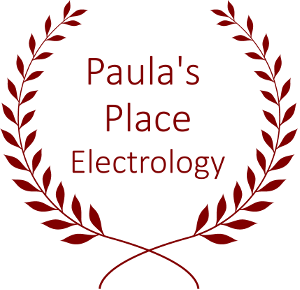Frequenty Asked Questions
- What is electrolysis?
Electrolysis involves placing a very fine needle into a single hair follicle. The needle transfers a small, measured amount of electric current to the base of the hair follicle so that it can no longer produce new hair. The existing hair is then properly removed.
- Is electrolysis safe?
Electrolysis has been proven safe since 1875 and is the only FDA approved method to permanently remove hair. Paula’s Place uses the most technologically advanced equipment and strictly follows sterile procedures with the use of disposable needles and disposable gloves in an immaculate facility.
- Where on the body can electrolysis be used?
Electrolysis is appropriate for hair removal from beards, bikini lines, backs, necks, breasts, nose surfaces, chins, eyebrows, upper lips (moustache area), ears, legs, and toes.
- Does electrolysis hurt?
Some individuals may feel temporary discomfort, depending on their level of sensitivity. It is important to share with Paula what you are feeling so that adjustments to the procedure can be made to make your experience as comfortable and pleasant as possible.
- What could cause additional hair growth?
Many of the following factors can contribute to hair growth including:
- Genetics
- Puberty
- Pregnancy
- Hormonal Imbalance
- Cortisone Treatments
- Diabetes
- Menopause
- Endocrine Problems
- Excessive Nerves
- Medications
- How many treatments are needed?
The number of treatments will depend on the amount of hair removal you seek. While some people have a single session every few months to remove a few stray hairs, others have more frequent treatments depending on hormone levels and how long you have been tweezing, waxing, or using depilitories. You will see results in a short time. During your first appointment, Paula will discuss a plan of treatment to meet your goals.
- Are there side effects to electrolysis?
After the procedure, some individuals may experience temporary reddening of the treated area and minor swelling when a sensitive area of the body has been treated. These effects typically last 20 to 60 minutes and can be reduced with a short application of ice and a cover-up lotion.
- Do I do need to prepare for electrolysis?
Paula recommends that (1) you are hydrated by drinking water before a treatment, and (2) about 30 minutes before your first treatment, take over the counter medication that you would typically take for a headache, such as ibuprofen (Advil or Motrin), acetaminophen (Tylanol), or aspirin.
- Is electrolysis for all hair and skin types?
Since being developed by a physician in 1875, electrolysis has been the only recognized method of permanent hair removal for every skin type, every degree of skin pigmentation and every level of sensitivity. Unchallenged by newcomers into the hair removal market, electrolysis remains the very best choice in safe, permanent hair removal.
- How does electrolysis compare to laser hair removal?
Electrolysis and laser hair removal both provide long lasting effects, but only electrolysis provides FDA approved, 100% permanent results. Laser works differently by damaging the hair to slow down its growth rather than preventing it.
- Electrolysis is safe and effective for all skin types and all hair types.
- Electrolysis targets individual hairs.
- Electrolysis is safe for mole removal.
- Electrolysis is safe for tattoo areas.
- Is shaving and tweezing bad for me?
Temporary hair removal methods include shaving, tweezing, waxing, bleaching, depilatories and use of home mechanical devices. These methods can irritate the skin, may result with increased hair growth, and will require constant attention. Often, temporary hair removal does not achieve the look and the feel desired. Some methods and products can be harmful to the skin causing skin irritation, ingrown hairs and sometimes scaring. They may compound the problem rather than alleviate it.
